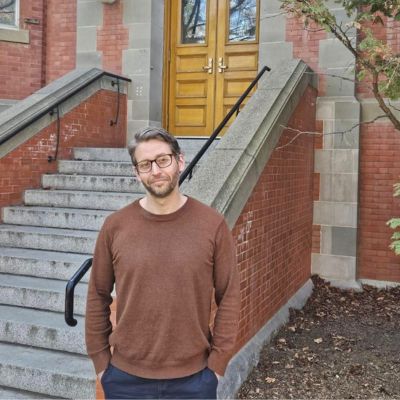Meet New Faculty Member Luke Kersten
16 July 2024

Dr. Luke Kersten
Luke Kersten recently joined the Department of Philosophy as an Assistant Professor. We caught up with him and asked him about his work and interests.
What inspired you to enter this field?
I think I was initially attracted to philosophy because of the depth and scope it offered. I found in philosophy an endless supply of interesting and challenging questions, ones which fed a natural curiosity and skepticism. I was particularly attracted to the set of fascinating puzzles surrounding the mind. From the relation between the mental and physical to the nature of mental causation, I was never short of philosophical bones to chew or sticks to chase. I was also inspired early on by the rigour of the subject. The exacting demands of philosophy meant I was consistently pushed in my thinking. Philosophical analysis required a constant probing and examination of core assumptions. I have often been humbled by the intellectual and emotional demands philosophy levies. Several wonderful teachers and mentors also helped me find my way to the subject. I was fortunate to have been guided in the early days by several excellent examples of intellectual precision, humility, and wit.
What can you tell us about your professional background and what have you enjoyed most about your career so far?
I began my academic career at the University of Ottawa pursuing a (Hon.) BA in Philosophy. This was followed by a MA in Philosophy from the University of Alberta, a MSc in Cognitive Science from Carleton University, and finally a PhD in Philosophy from the University of Edinburgh. My first post was at the Ruhr University Bochum as a postdoctoral research fellow, followed shortly thereafter by a research stint at the University of Lisbon. Finally, giving up the sun-soaked beaches of Portugal, I returned to my alma mater at the University of Alberta to take up a position as a Killam postdoctoral fellow. I think what I have probably enjoyed the most about my career so far is the wonderful range of people I have been able to work with. During my time in Edinburgh, I was surrounded by a colourful cast of characters studying everything from constructivist metaethics to phenomenal consciousness. At Bochum, I was fortunate to find a stimulating environment filled with like-minded collaborators pursuing interesting topics in the philosophy of mind. In Lisbon, I was spoiled by a tight-knit group of passionate yet relaxed researchers. And then here at the University of Alberta, I have once again been blessed with a diverse array of supportive colleagues. I have always thought philosophy was at its best when pursued in a spirit of community and my professional career has fortunately reflected this.
What can you tell us about your research?
My research is primarily in philosophy of mind and cognitive science, but I also have interests in philosophy of science and AI. I am particularly interested in computational theories of mind, mental representation, artificial consciousness, extended and embodied cognition, music cognition, and levels of explanation. My most recent work has been exploring the nature of theory and paradigm selection in cognitive science. I am keen to bring the resources of philosophy of science to bear on questions of pressing interest to contemporary cognitive science. I would say my approach to research is largely interdisciplinary and naturalistic in character. I believe a better understanding of the mind and brain requires drawing on an array of empirical and philosophical resources. Having been trained in the cognate sciences, I regularly look to develop collaborative and cooperative relationships within and across disciplines. I try to develop constructive connections between different methods of investigation and areas of thought wherever possible.
What’s your personal teaching philosophy?
I would say my teaching philosophy rests on an enduring appreciation for the value of enabling students to grow as thinkers. My main focus is on helping students to cultivate their abilities to reflect, analyse and engage with thorny questions and problems, be they moral, philosophical, or practical. To this end, I often strive to make my teaching student-centred and driven. Empowering students to lead the direction, focus, and pace of learning I think helps them to feel engaged and enthusiastic about their work. I try hard to foster a space in which students feel comfortable asking questions and participating, even when discussion gets tricky. I aim to provide a welcoming and friendly atmosphere, one that maintains an important balance between accessibility and rigour.
What are your interests/hobbies outside of work?
I grew up camping and canoeing in Algonquin Park in Ontario. Ever since I have carried a passion for the outdoors. From the Rockies to the Munros of Scotland, I try to escape into nature whenever possible. I am also (perhaps predictable) an avid consumer and player of our national pastime. Even during my time in the UK, I spent many an hour in the pursuit of a national ice hockey championship. On a slightly less physically-demanding note, I also like to volunteer with children’s educational programming and initiatives, and I never say no to a good book, board game, or hand of cards.